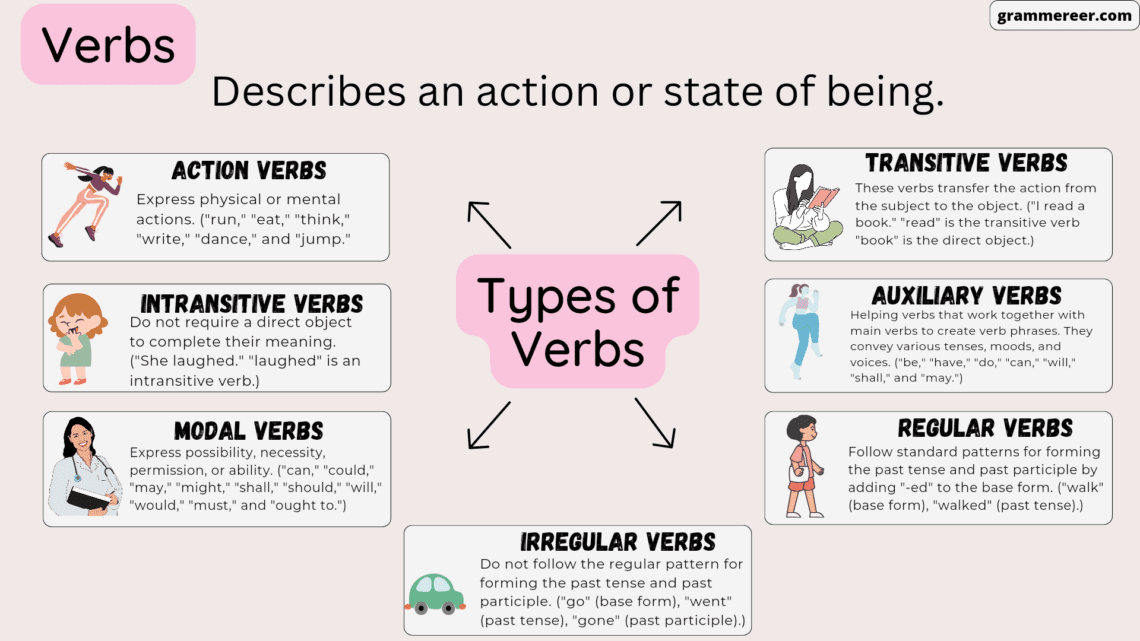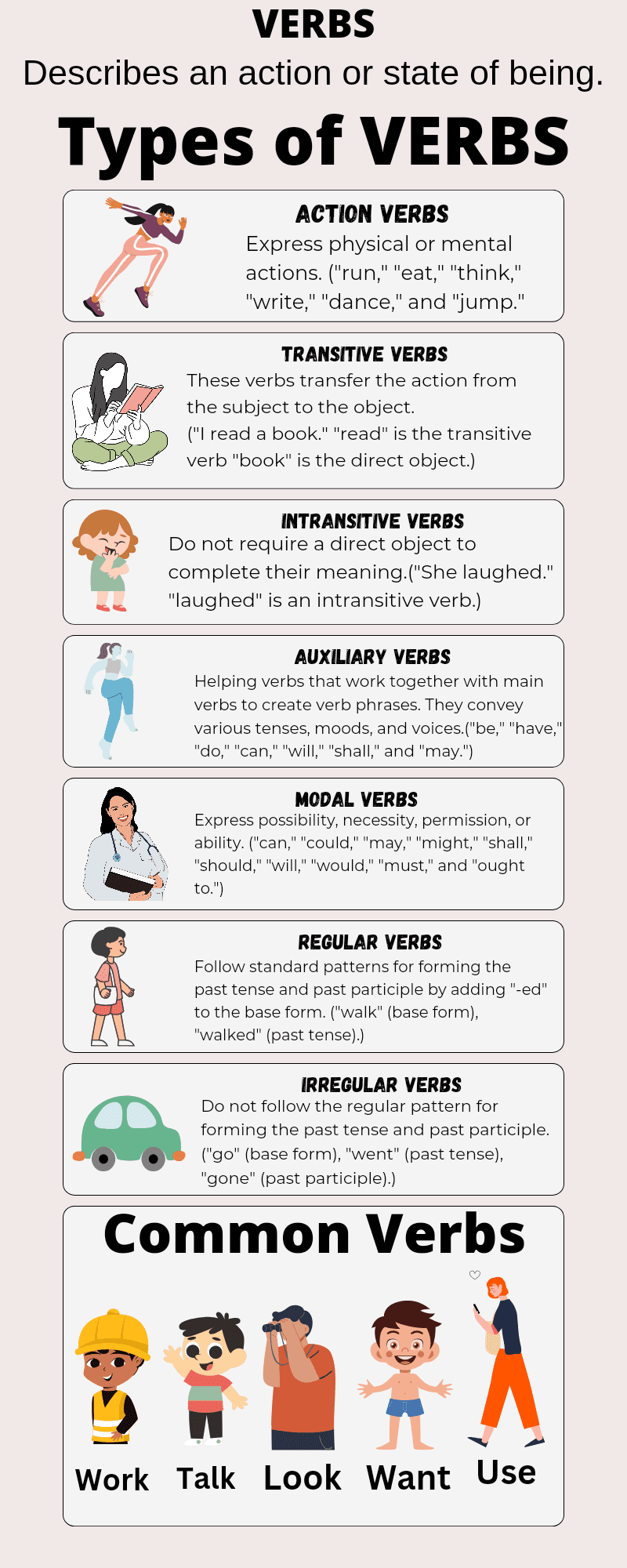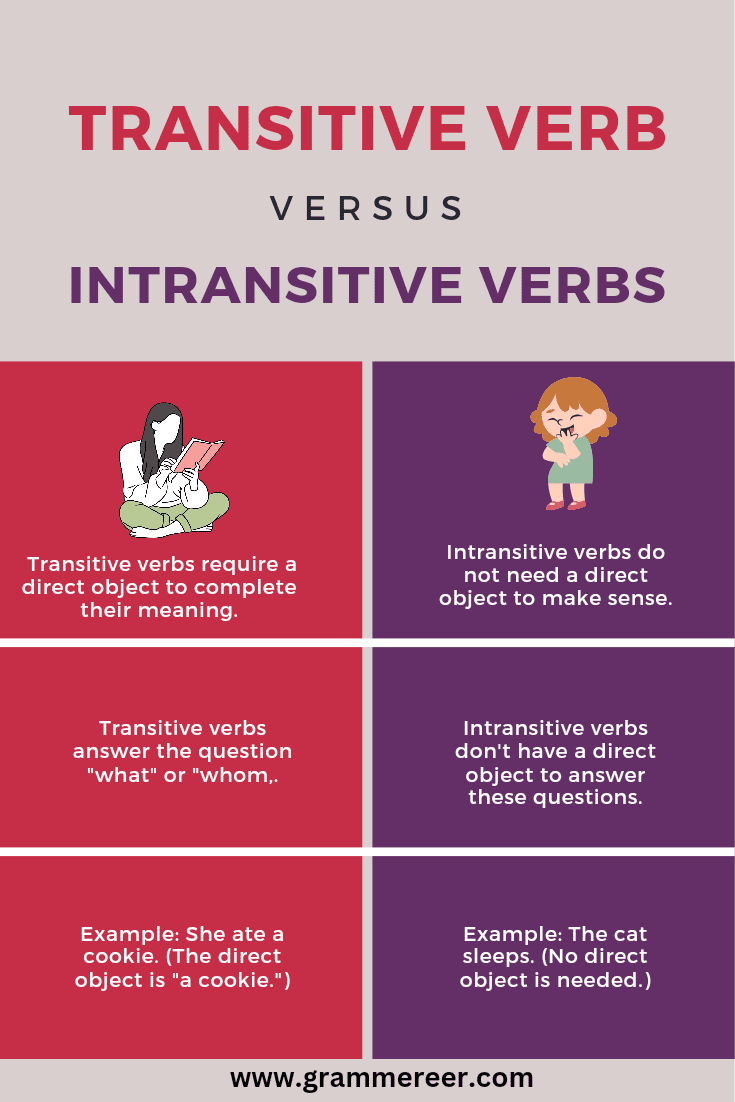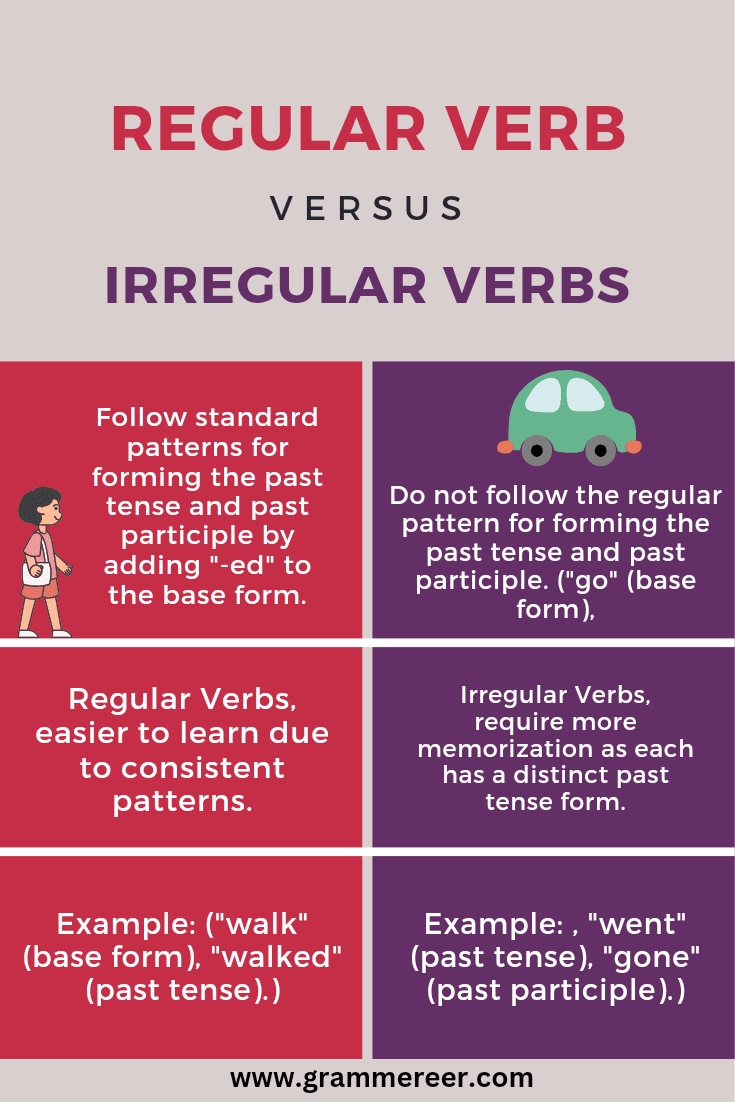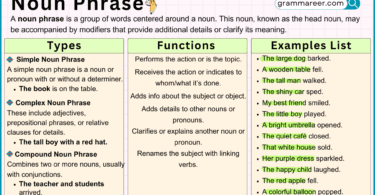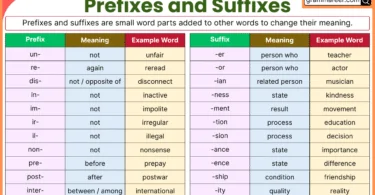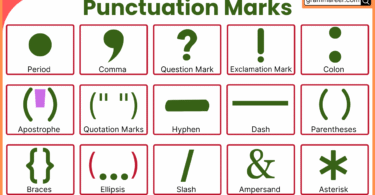Words that show action or state are called verbs. There are various types of verbs, each playing a unique role in sentences. Some tell about actions, and others just exist. We’ll explore these types of verbs to make sentences more interesting and clear. Join us on this language journey!
Table of Contents
What is a verb?
A verb is a word that tells what someone or something does. It’s an action word, showing activities like running, jumping, or thinking. Verbs also express states, like being or feeling. Understanding verbs helps us describe actions and create lively, meaningful sentences in English.
Examples:
- I eat breakfast every morning.
- The cat sleeps on the sofa.
- She reads books for fun.
- We play soccer after school.
- The sun shines brightly in the sky.
Verbs for Doing Action
Action verbs are words that show what your body does. Here are some examples:
- Run: I run in the park.
- Jump: He jumps over the hurdle.
- Eat: We eat delicious food.
- Dance: She dances at the party.
- Laugh: They laugh together.
Verbs for Feelings and Experiences
These are words for things you feel or experience, not actions. Some examples:
- Love: I love my pet.
- Enjoy: We enjoy movies.
- Feel: She feels happy.
- Imagine: They imagine adventures.
- Remember: I remember my birthday.
Verbs for States and Conditions
These are words for situations or how things are. Some examples:
- Is: The sky is blue.
- Are: Flowers are colorful.
- Seem: It seems quiet.
- Exist: Dreams exist.
- Feel: I feel tired.
Types of Verbs
Verbs come in many types based on what they do in a sentence. Let’s explore these types and see some examples for each:
- Action Verbs: Show doing (e.g., run, play).
- Transitive Verbs: Need an object (e.g., eat, read).
- Intransitive Verbs: Stand-alone (e.g., sleep, exist).
- Modal Verbs: Express ability or possibility (e.g., could, might).
- Auxiliary Verbs: Assist main verbs in sentences (e.g., is, can, or will)
- Regular Verbs: Follow a pattern when forming past tense (e.g., “play” becomes “played.”)
- Irregular verbs: Don’t follow the usual rules (e.g., “go” becomes “went.”)
Action Verbs
Action verbs are all about doing things. They can be about moving your body or using your brain. For example, words like jump, hit, and sing show physical actions. On the other hand, think, consider, and memorize represent actions happening in our minds.
List of Action Verbs:
- Run
- Jump
- Hit
- Sing
- Think
Examples:
- Sarah runs every morning to stay fit.
- The children play in the park after school.
- The chef cooks delicious meals in the restaurant.
- My cat chases butterflies in the garden.
- I write notes to remember important things.
Transitive Verbs
Transitive verbs are action words that require a direct object to make sense. For instance, in “She bakes a cake,” ‘bakes’ is the transitive verb, and ‘cake’ is the direct object.
List of Transitive Verbs:
- Read
- Write
- Play
- Cook
- Eat
Examples:
- I read a story.
- She eats an apple.
- They play a game.
- He watches a movie.
- We write a letter.
Intransitive Verbs
Intransitive verb stands alone, not needing a direct object to complete its meaning. Imagine “She laughs” or “They arrived.” No specific object is required for the action to make sense. Intransitive verbs convey actions that don’t transfer to something or someone else.
List of Intransitive Verbs:
- Arrive
- Laugh
- Run
- Sleep
- Jump
Examples:
- The sun sets in the evening.
- I often laugh at funny jokes.
- Birds fly across the sky.
- The flowers bloomed in the garden.
- She sings
Auxiliary Verbs
Auxiliary verbs, or helping verbs, play an important role in shaping the structure of sentences. They work alongside the main verb to express time, possibility, necessity, or emphasis. For example, in “She is singing,” ‘is’ is the helping verb indicating the present action.
List of Auxiliary Verbs:
- be (am, is, are, was, were)
- have (has, have, had)
- do (does, do, did)
- will
- shall
Examples:
- She is reading a book.
- We have finished our homework.
- He will visit us next week.
- They can swim very well.
- I am going to the store.
Modal Verbs
Modal verbs, like can, should, and must, are tiny words with big meanings. They help express hypothetical situations, like giving advice, talking about abilities, or making requests. So, when you say, “You can do it,” you’re talking about possibility, and when you say, “We must finish,” it’s all about necessity.
List of Modal Verbs:
- Can
- Could
- Shall
- Should
- Will
Examples:
- I can
- You should eat your vegetables.
- She will arrive soon.
- We might go to the movies.
- He must finish his homework.
Regular Verbs
Regular verbs play a crucial role in forming the foundation of English grammar. These verbs follow a predictable pattern when transitioning between tenses. For instance, in the past tense, verbs typically end in “-ed.” Consider everyday actions like walk (walked), talk (talked), play (played), laugh (laughed), and cook (cooked).
List of Regular Verbs:
- Walk – walked
- Talk – talked
- Play – played
- Laugh – laughed
- Cook – cooked
Examples:
- I walk to the store every day.
- She talks to her friends on the phone.
- The children play in the park after school.
- He laughed at the funny joke.
- We cooked a delicious dinner last night.
Irregular Verbs
Irregular verbs can be tricky but fear not! These verbs don’t follow the typical pattern, yet they’re crucial for clear communication. Take, for instance, “go,” whose past tense is “went.” Here are five more examples: “eat” (ate), “buy” (bought), “have” (had), “do” (did), and “be” (was/were).
List of Irregular Verbs:
- go – goes, went
- come – comes, came
- see – sees, saw
- eat – eats, ate
- take – takes, took
Examples:
- I go to school every day.
- She saw a beautiful sunset.
- We ate lunch together.
- He ran in the marathon.
- They bought new shoes.
MCQs:
Q1. What type of verb is ‘run’ in the sentence “She runs every morning”?
a) Linking
b) Transitive
c) Intransitive
d) Auxiliary
Q2. In the sentence “He is a doctor,” what type of verb is ‘is’?
a) Action
b) Linking
c) Transitive
d) Intransitive
Q3. Identify the transitive verb in the sentence “She read a fascinating book.”
a) She
b) Read
c) Book
d) Fascinating
Q4. Which verb is auxiliary in “I have finished my homework”?
a) Have
b) Finished
c) Homework
d) I
Q5. What is the intransitive verb in “The sun sets over the horizon”?
a) The
b) Sun
c) Sets
d) Horizon
Q6. In “They were singing happily,” what is ‘were‘?
a) Action
b) Linking
c) Auxiliary
d) Intransitive
Q7. Which verb is transitive in “She painted a beautiful picture”?
a) She
b) Painted
c) Beautiful
d) Picture
Q8. Identify the action verb in “The cat chased the mouse.”
a) The
b) Cat
c) Chased
d) Mouse
Q9. What type of verb is ‘become’ in “He became a successful entrepreneur”?
a) Action
b) Linking
c) Transitive
d) Intransitive
Q10. In “We are watching a movie,” which verb is helping the main verb?
a) Watching
b) We
c) Are
d) Movie
Answers:
- c) Intransitive
- b) Linking
- b) Read
- a) Have
- c) Sets
- c) Auxiliary
- b) Painted
- c) Chased
- b) Linking
- c) Are
FAQs:
Q1.What is the difference between action verbs and linking verbs?
Action verbs express physical or mental actions, while linking verbs connect the subject to a subject complement, often describing a state of being.
Q2.Can you provide examples of transitive and intransitive verbs?
Transitive verbs require a direct object (e.g., “She read a book”), while intransitive verbs do not (e.g., “He sleeps”).
Q3.How do auxiliary verbs function in a sentence?
Auxiliary verbs (helping verbs) assist the main verb in expressing tense, mood, or voice. Examples include “is,” “have,” and “will.”
Q4.What role do modal verbs play in sentences?
Modal verbs, like “can,” “should,” and “must,” express possibility, necessity, or permission in a sentence.
Q5.Why are linking verbs crucial for sentence structure?
Linking verbs connect the subject to its complement, providing essential information about the subject’s state or identity, helping to complete the sentence’s meaning.
YOU MAY ALSO LIKE

